DIRECTOR’S CORNER; ARNON GOLDFINGER

The Israeli filmmaker Arnon Goldfinger is a true cinéaste, whose films have won many prestigious awards.
His revelatory documentary THE FLAT narrates his discovery of his German-born grandparents’ — the Tuchlers’ — unusual history with a Nazi, Leopold von Mildenstein.
For The Journal for the Study of Antisemitism, I wrote a commentary on THE FLAT.
In this interview, I catch up with Arnon.
1) Please tell us a little about your 1995 documentary ANNE’s WAY.
In the mid-nineties, I was approached by the chief editor of the Israeli children’s TV Channel. She wanted me to direct a short documentary about Anne Frank. When I was a kid, every Holocaust Remembrance Day, there was a TV broadcast of a heavy-handed theatrical play of the Anna Frank story. Neither I nor my friends wanted to watch it, because it was too frightening for us.
So my task was to tell the story in an accessible way for children in the present. I thought that the key for such a film should be the character of Anne as a child, and as a teenage girl, not as an icon. The film, ANNE’S WAY, was mainly shot in Amsterdam, and includes interviews with Jewish children. For me, the most moving sequence in the film is an interview with Hanna Pick, a very impressive woman who was a close friend of Anne’s. Hannah shares colorful memories of their childhood together in Amsterdam, right up until the day that Anne went into hiding in the house at Prinsengracht 263.
The film was first broadcast in 1995 and has been broadcast on every Holocaust Remembrance Day for the last 21 years. So you may say, it is, in this perspective, my most successful film. Interestingly, on each of the last 4 Holocaust Remembrance Days, two movies of mine have been broadcast on Israeli TV, ANNE’s WAY and THE FLAT.

(Anne Frank)
2) What compelled you to become a documentary film maker?
As a film student, I concentrated on making fictional films. My first movie, THE BENNY ZINGER SHOW, was a short dramatic comedy.
I started to work on a script for a fictional film with my friend the scriptwriter Oshra Schwartz. One day, she showed me an article in the newspaper, saying: “I think it’s a good starting point for a documentary film. We can make it quickly as well as with a small budget, and meanwhile we’ll continue writing the fictional script.”
I decided to give it a try. Well, we were very naïve. It took me 4 years to make this documentary, which turned out to be quite an expensive movie. However, I discovered a totally new world of film-making, and this became my first documentary feature, THE KOMEDIANT, which is about the vanishing world of Yiddish theater. I became so devoted to the making of THE KOMEDIANT that I abandoned my fiction project.
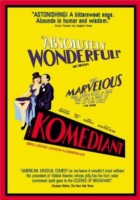
(Promotional poster for THE KOMEDIANT)
3) What specifically inspired you to make your film THE KOMEDIANT?
When I started work on THE KOMEDIANT, I had very little knowledge of the Yiddish theater. Therefore, before I started shooting, I researched the subject for 2 years, during which I met most (if not all) of the last remaining living legends of the Yiddish stage in Israel and the USA. They shared their stories with me. Those were two extremely entertaining years! Of course in the end, I concentrated on the history of just one family, the Bursteins, however, the other artists and their bittersweet way of telling stories served as inspiration for the film.
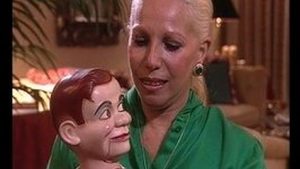
(A still shot from THE KOMEDIANT)
4) Has making and promoting THE FLAT changed your view of Berlin, and if so, in what ways?
My first visit to Berlin was in 1985, when the city was still divided. I came from Amsterdam by bus, and during the ride, all of the passengers had to be inspected a few times by harsh East German policemen. The western city looked quite mysterious, a bit crumbled, full of young pacifistic students, and there was a generally hedonistic atmosphere . . . . leastwise, as seen through the eyes of a young man in his twenties. 20 years later, though, when I started traveling to Berlin for the research and production of THE FLAT, I arrived in a completely different place. The city was united, it had become the capital of Germany, a major European metropolitan city, a magnet to European youngsters and real estate sharks . . . and of course I came as a grown-up, well aware of my family ties to the place, so the city talked to me in completely different ways.
When I first entered the production studio, what immediately struck me was that I felt almost as I feel when I enter such a studio in Tel Aviv. The language was of course different but somehow the people looked and behaved as the ones I work with in Tel Aviv, they even dressed similarly (well, it was summer). I believe it is the influence of the global village, and of the effect that post-modern metropolitan cities have on our life, that make us, their inhabitants, look more and more alike, if only at a first, superficial glance.
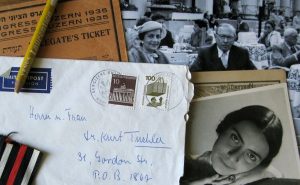
(A still shot from THE FLAT)
5) Have you made any significant discoveries about the Tuchlers and/or the von Mildensteins since you finished THE FLAT?’
The level of success of The Flat was a real surprise for me. One of the things that still amazes me is the amount of written feedback that I received — and am still getting — through emails, Facebook, letters, postcards and so on. Among those hundreds of communications, from time to time, I was approached by people who had information about the Tuchlers and/or the von Mildensteins. Indeed, I heard some interesting details, and some funny anecdotes, but I can’t say that I encountered any real significant discovery or anything that could change my film or my view of the subject.
6) Please share some of your memories of your German-Jewish grandparents, the Tuchlers.
I would like to share one scene that was repeated every autumn in the sixties and seventies, that of my grandparents coming out from the airplanes that brought them back to Israel after their summer vacations in Germany. My grandparents spent almost every summer in Germany — and I am talking about months of vacation. The day of their return was a very special day in our family. Everyone — my parents, my siblings, uncle, aunt, cousins and I used to drive to the international airport to welcome them. When we arrived at the airport we climbed to its top floor to see the airplanes landing. We’d be waiting for a long hour, competing among ourselves over who would be the first to spot their airplane, usually a Lufthansa plane. Finally they landed, and everyone was holding their breath until we could see them coming out of the airplane gangway. They had their grand “entrance.” Usually, it was a typical hot Israeli day, but they came out of the airplane wearing heavy fur coats, beautiful new hats, and holding gloves in their hands, waving toward us. Their appearance was like that of a head of state and his wife coming on official visit.

(Photo of Ben Gurion Airport)
7) Please tell us about a recent film you saw and enjoyed, and let us know why you liked it.
In the spirit of this interview, I recommend a new German movie, Maren Ade’s TONI ERDMANN, a refreshing, bittersweet, one-of-a-kind comedy that offers a poignant and ironic look at the contemporary race for achievement and self-fulfillment, portraying a generation gap with a very eccentric father and daughter pair.
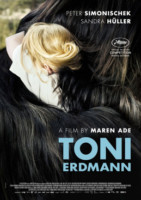
(Promotion poster for Maren Ade’s film TONI ERDMANN)
8) What are you up to these days?
For me, the period between making films is most mysterious. I worked on THE FLAT for 5 years and then spent more than 3 years in distributing it (and, I’ll add, the promotions are ongoing). Needless to say, THE FLAT has played a major part in the past decade of my life. However, I am already in what some call a transition period; others call it ‘incubation time.’ Because I see every film that I make as a new journey in a new direction, I am curious to discover where the new path is taking me.
*******
Read my commentary on Arnon Goldfinger’s film THE FLAT here.
Arnon Goldfinger is on Facebook here.
And the page for Arnon Goldfinger on IMDb is here.
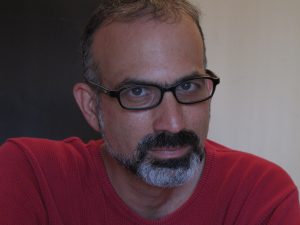
Great Interview. I did a similar interview with Arnon to prepare for a screening for a film festival in New York. It was wonderful finally meeting Arnon here. I go to Berlin often to conduct my workshops on Holocaust Reconciliation.